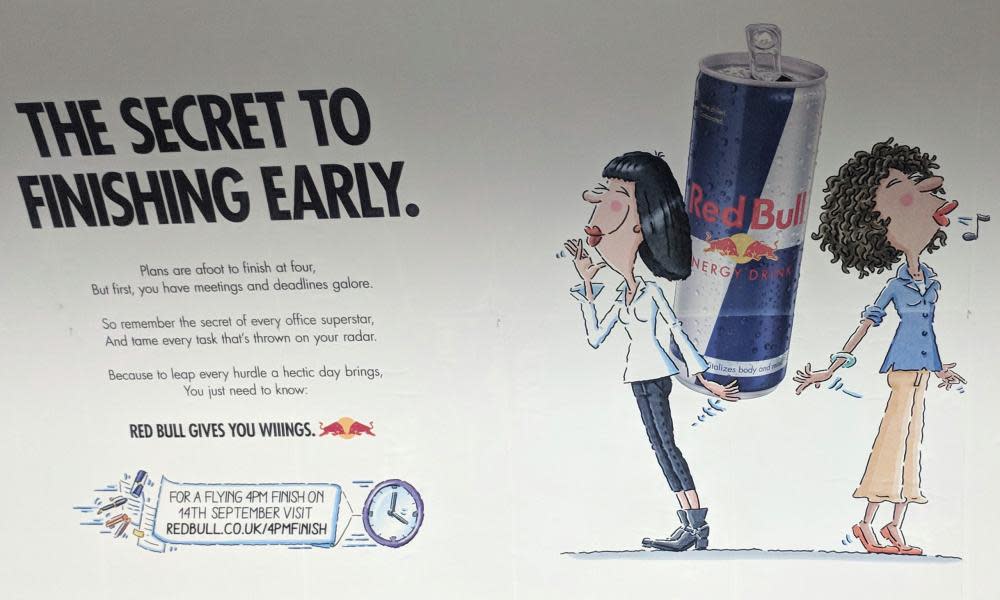Red Bull wants us to leave work at 4pm. I couldn’t agree more

I’m not squeamish, except for one small thing: I cannot repeat rhyming couplets. So I can’t tell you exactly what Red Bull’s latest London Underground advert says because it uses this mawkish lyrical form. I can tell you that it was reprimanded by the Advertising Standards Authority for promising health benefits that fizzy drinks aren’t allowed to do (nope, not even Shloer). I can even describe that promise, in a roundabout way: Red Bull will make you feel so energetic that you’ll finish all your work and leave at four. I think the rhyme, rather than the purported health benefits, is what really riled the person who complained and got it banned.
Leaving work at 4pm is the opposite of what you’re supposed to want; serious people work all the time. I haven’t had an office job since 1999. Over the years, I’ve learned a ton of things that people with jobs will never know: who Winifred Robinson is; what squirrels do all day; why corner shops only allow two schoolchildren in at any one time. But most of all, from this epic distance, I’ve been able to track the long-hours culture – when it’s been at its worst, what has been driving it – and then I’ve been able to ruminate on what it all means, because no one is yakking in my ear about carrot cake.
Late-90s loafing culture – go to work if you must, but try not to show everyone else up – eventually gave way to a fulfilment creed. You had to be at your desk until midnight, not because you were a lickspittle running dog to The Man, but because you loved it so much that you didn’t want to leave. If you did, you weren’t being true to yourself, so you were a loser. It was all a scam, as far as I could tell: it had a macho undertone, distilled in another seminal advert, that for Lemsip Max when it was first invented: “What kind of a person goes into work with flu? The one who wants your job.” People with passion worked all the time. Real men worked all the time. It was employment reimagined as a bullfight: you took your whole soul to it, risked your skin, ended up with gunk all over you, but got a beautiful, bejewelled cape. It didn’t seem like most workplaces. But what did I know? E4 had just been invented and I spent most of the day watching Friends.
Then it turned, on a sixpence: everyone was talking about work-life balance and adverts were full of men sporting executive weekend-wear in a forest. This trend piled like a crash on a motorway, first into the Blackberry, then the smartphone, to bring us, more or less, to where we are today. Now it doesn’t matter where your desk is, because you’re always checking your work email, so you’re always at work. And if you’re not in the knowledge economy, you’re in the gig economy, where you’re always waiting to find out when you’ll next be at work, so stress-wise, are still at work. Indeed, a study this week found that parents who worked flexibly did more unpaid work than anyone else. The hidden story to this is that, if you’re working all the time, make damn sure someone can see you, since that way you’ll at least be paid.
The only real bulwark against the conditions of neo-serfdom is a deliberate slacker sensibility, where you leave at 4pm because you’ve finished, and you don’t intend to start again until the following day. So I’m with Red Bull on this. Plus, and this is a really niche view: I find it delicious.

 Yahoo News
Yahoo News 
